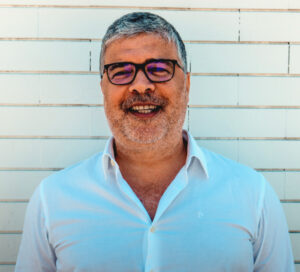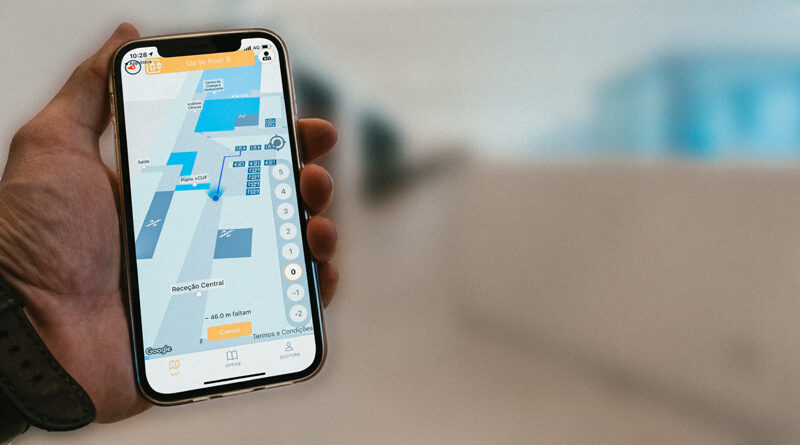TECHNOLOGY SOLUTIONS ADDING VALUE TO THE NHS – AND SAVING MONEY
Digital health and care solutions provide a wide variety of support for the NHS. From health monitoring to remote care, new technology is helping our healthcare professionals to become more person-centred, prevention-focused and efficient. And with efficiencies come savings, freeing up funding to be used to help patients and innovate further. Here are just a few of the areas where exciting technologies are saving the NHS money.
Wayfinding
Wayfinding is an important step forward in making hospitals become more patient-oriented. It also saves the hospital time and money, and BuzzStreets is determined to help by revolutionising the Geolocation industry through mapping, navigation, and the tracking of people and objects in complex indoor and outdoor environments. This then improves hospital visitor and staff experiences. The system helps plan and optimise spaces by recording user analytics and providing hospital managers with an understanding of user indoor behaviour.
More than 85% of patients ask for directions when they go to a hospital or other public health facility, and 30% of first-time visitors get lost. Wayfinding enables patients and other visitors to navigate from outside the hospital all the way to the specific location they need, whether that is a bed on a ward, a consulting room, the café, or the pharmacy.
This saves staff time; many times a day doctors and nurses are stopped (and therefore delayed) by visitors asking for directions; and often patients are late for appointments as they are lost within the hospital. Indoor Wayfinding solves both these problems.
BuzzStreets indoor way-finder for hospitals—which could help the NHS save over £240million per year—has already been successfully piloted at Chelsea & Westminster Hospital and is being rolled out to other hospital Trusts around the UK, starting with West Middlesex University Hospital.
Virtual Wards
Virtual wards (also known as remote patient monitoring) is a reimagining of patient care. Teaming up mobile phones and wearable health technology allows clinicians to keep a watchful eye on patients outside of hospitals. Data is sent back to the hospital in real-time and if a patient’s vitals were to go downhill, a doctor or nurse can call the patient into the hospital for immediate treatment.
Virtual ward company Doccla, which works with hospitals in Northampton, Cambridge, County Durham, Hertfordshire and Essex, lists benefits such as early discharge of patients (because care can continue at home), fewer readmissions, and lower costs (savings of up to 35%).
The pandemic supercharged the adoption of this tech, and it is being rolled out to patients with other chronic conditions such as heart disease, diabetes, asthma.
Independent Living
Tunstall Healthcare also provides assistive technology to the NHS, social care providers, and local authorities. Their products support vulnerable people, allowing them to live safely and independently for longer, and enable significant cost savings as emergency events (such as falls) and ambulance call-outs are reduced. This then also leads to fewer beds and emergency care in hospitals being required.
Bolton NHS Foundation Trust and Bolton Clinical Commissioning Group invested in remote patient monitoring technology in April 2020 for 34 of the town’s care homes to protect residents, staff and clinicians during the COVID crisis. The Trust and CCG implemented a number of innovative services to deliver closer monitoring of the health of vulnerable residents, while reducing the need for clinical staff attendance, the risk of cross infection, and hospital admissions.
Virtual visits
‘NHS Book a virtual visit’ allows busy ward staff to book—easily and quickly and safely—visits between patients and their loved ones, wherever in the world those friends and family may be. Minimal data is required for this cloud-based service that was created within the principles of open source and to NHS Digital and Government Digital Service standards. It works across all operating systems and requires no third-party application installation. So, it can be accessed via any website browser and works across all devices.
Software company Made Tech were tasked with creating a system that had to work on ward Wi-Fi and on a variety of devices, and that had to be simple for patients, clinicians and ward staff to use. In the first five months of being introduced at Kettering General Hospital, ‘NHS Book a virtual visit’ facilitated over 900 visits, across 25 wards, averaging calls of 50 minutes between patients and loved ones. This included the Emergency Department, where ‘NHS Book a virtual visit’ is now facilitating communication in short stay wards, where patients might not have access to their own communication device.
Mental Health
As a digital mental health provider to the NHS for children and young people (for persons aged 10-25), Kooth saves the NHS time and costs. A fully accredited counselling service with the British Association of Counselling and Psychotherapy, Kooth gives children and young people immediate access to an online community of peers and a team of experienced, accredited counsellors. The service offers complete anonymity, it is open for support 365 days per year, and access is free of typical barriers to mental health support: no waiting times; no referrals; no thresholds to meet.
During the COVID-19 pandemic the top presenting issues amongst children and young people were anxiety, self-harm and suicidal thoughts, relationship issues (family, friends etc), sadness, self-worth; school/college issues. Kooth is available in over 140 Clinical Commissioning Groups and is delivered in Wales through the local Health Boards and Councils.
Communication
The news at the beginning of 2021 that changes to WhatsApp privacy policy meant users would be sharing vast amounts of data with Facebook dented confidence in WhatsApp as a healthcare comms tool. Having people across healthcare connected is important, and, as part of its freemium offering, mobile healthcare app Ryalto has made its app messenger service available at zero cost for the NHS and private hospitals. Safe, secure, scalable and ring-fenced within the organisation, Ryalto has all the features of WhatsApp yet mitigates security risks and uses no personal data.
Currently live across more than 70 NHS Trusts and 40 private hospitals, the app allows hospital staff to display live news, find the latest protocols, search, call or message all colleagues via the preloaded directory, and users do not need to share any personal details, including their own mobile number.
Healing help
The amount of nursing hours devoted to dressing and treating chronic wounds when they heal incredibly slowly is a huge issue. Accel-Heal is an electrical stimulation device for treating chronic wounds like leg ulcers, something that affects a huge percentage of the UK population.
Electrode pads are placed beneath the usual wound dressing, and by delivering an automated programme of subsensory electrical pulses to the affected area—not normally felt by the patient—the device relieves pain and stimulates healing in hard-to-heal leg ulcers, diabetic foot ulcers and pressure ulcers. The device can then be tucked into the external wound dressing or a pocket due to its small size. The device can also be applied underneath compression therapy.
Patients treated with Accel-Heal healed, on average, 3.6 weeks faster than patients being treated with conventional treatment. For patients who are successfully healed in a 24-week period, there is a cost saving of almost £8,000 to the NHS, as well as more than a hundred weeks of GP and nurse time per 100 patients treated.
Prevention
Acute Kidney Injury (AKI) is a major healthcare burden, estimated to cost the NHS around £1billion per year. It is a particular concern for clinicians managing cardiac patients following surgery: AKI occurs in up to 12% of patients undergoing surgery procedures and about a third of patients following cardiac surgery.
Using routinely taken physiological measurements, medtech start-up Rinicare’s AI-driven STABILITY UO (urine output) can predict the future probability of low urine output in time for clinicians to take preventive action to reduce the risk of developing AKI. This risk prediction is personalised for each patient, is available after only six hours of post-operative monitoring and is updated hourly. The risk prediction score can not only highlight high-risk patients but can also help to guide clinicians in their discharge decisions for low-risk patients, allowing them to be moved out of critical care more quickly.
In addition to aiming to reduce AKI costs to the NHS, the Rinicare team is also developing new applications for the STABILITY platform, including a recently launched application for atrial fibrillation (AF).
Conclusion
Releasing hospital bottlenecks and removing obstacles to efficient hospital discharges is just one area where technology is taking an increasingly important role. With the ability to be deployed outside hospital settings, digital solutions can provide patients and their loved ones with much-needed and appreciated reassurance that risks can be reduced at home. Technology can also improve the experience of patient, visitor and staff inside hospital buildings, ensuring people and equipment are where they need to be. As we live longer, demands on medical services will increase and innovation in technology is crucial to ensuring the NHS is supported and can continue to provide the highest levels of care.
ABOUT THE AUTHOR
 Joe Fernandes, founder and CEO of BuzzStreets, an award-winning navigation platform, that enables organisations (hospitals, shopping malls, airports, offices, stadiums, etc.) to offer their customers an indoor way-finder that allows them to navigate inside the building. The client arrives at the entrance or reception and then uses the bespoke app to navigate to the specific location (room, shop, check-in, office, or even seat) they need. BuzzStreets also supplies movement analytics that can help improve building efficiency and keep track of vital equipment.
Joe Fernandes, founder and CEO of BuzzStreets, an award-winning navigation platform, that enables organisations (hospitals, shopping malls, airports, offices, stadiums, etc.) to offer their customers an indoor way-finder that allows them to navigate inside the building. The client arrives at the entrance or reception and then uses the bespoke app to navigate to the specific location (room, shop, check-in, office, or even seat) they need. BuzzStreets also supplies movement analytics that can help improve building efficiency and keep track of vital equipment.
buzzstreets.com
facebook.com/buzzstreets
twitter.com/BuzzStreets
youtube.com/channel
Links to companies mentioned:
buzzstreets.com
accelheal.com
doccla.com
madetech.com
rinicare.com
ryaltogroup.com/healthcare
tunstall.co.uk

